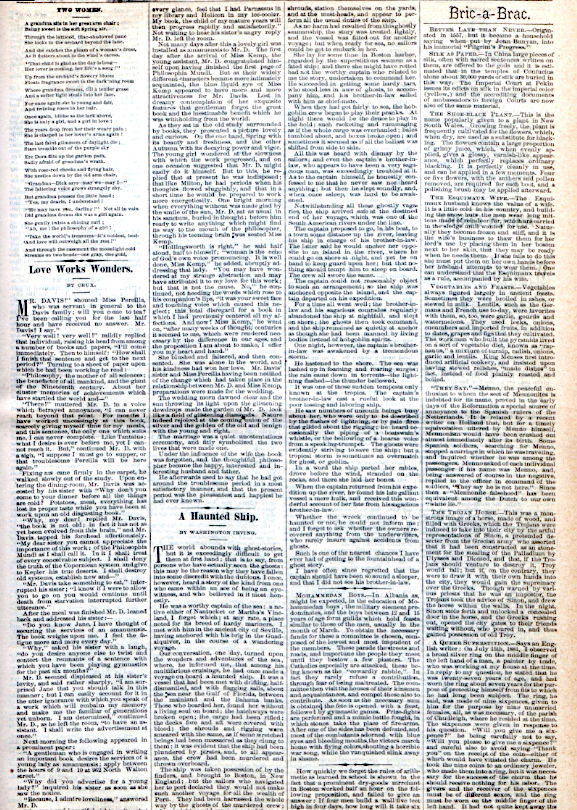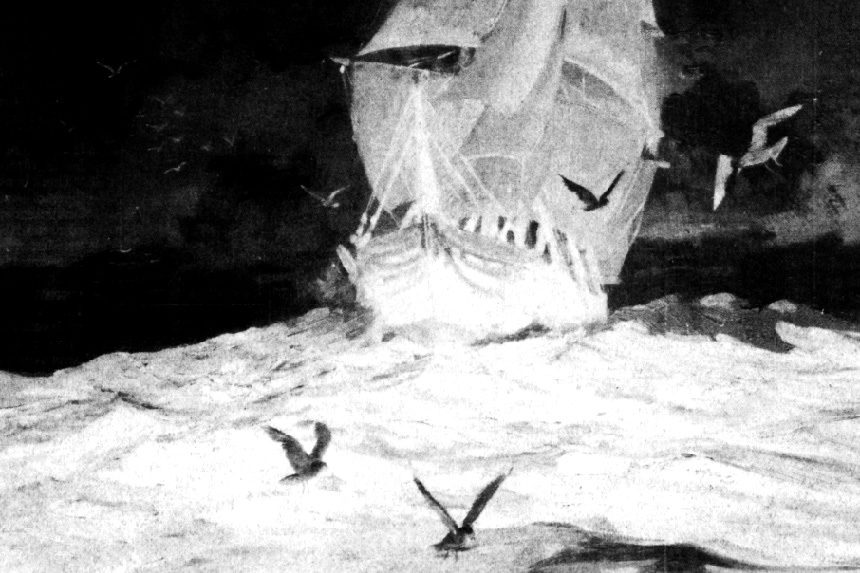The celebrated author of “The Legend of Sleepy Hollow” and “Rip Van Winkle” appeared in the Post several times in the 19th century. His story “A Haunted Ship” (or, “A True Story — As Far As it Goes”) is an apparently true account told to Irving by a seafaring friend.
Published on October 8, 1881
The world abounds with ghost stories, but it is exceedingly difficult to get them at firsthand; that is to say, from persons who have actually seen the ghosts: this may be the reason why they have fallen into some discredit with the dubious. I once, however, heard a story of the kind from one who came within an ace of being an eyewitness, and who believed in it most honestly.
He was a worthy captain of the sea: a native either of Nantucket or Martha’s Vineland, I forget which; at any rate, a place noted for its breed of hardy mariners. I met with him in the ancient city of Seville, having anchored with his brig in the Guadalquiver, in the course of a wandering voyage.
Our conversation, one day, turned upon the wonders and adventures of the sea, where, he informed me, that among his multifarious cruisings, he had once made a voyage on board a haunted ship. It was a vessel that had been met with drifting, half-dismantled, and with flagging sails, about the sea near the Gulf of Florida, between the mainland and the Bahama banks. Those who boarded her, found her without a living soul on board; the hatchways were broken open; the cargo had been rifled; the decks fore and aft were covered with blood; the shrouds and rigging were smeared with the same, as if some wretched beings had been massacred as they clung to them; it was evident that the ship had been plundered by pirates, and, to all appearance, the crew had been murdered and thrown overboard.
The ship was taken possession of by the finders, and brought to Boston, in New England; but the sailors who navigated her to port declared they would not make such another voyage for all the wealth of Peru. They had been harassed the whole way by the ghosts of the murdered crew; who at night would come up out of the companion-way and the forecastle, run up the shrouds, station themselves on the yards, and at the mastheads, and appear to perform all the usual duties of the ship.
As no harm had resulted from this ghostly seamanship, the story was treated lightly, and the vessel was fitted out for another voyage; but when ready for sea, no sailors could be got to embark in her.
She lay for some time in Boston harbor, regarded by, the superstitious seamen as a fated ship; and there she might have rotted had not the worthy captain who related to me the story, undertaken to command her. He succeeded in getting some hardy tars, who stood loss in awe of ghosts, to accompany him, and his brother-in-law sailed with him as chief-mate.
When they had got fairly to sea, the hobgoblin crew began to play their pranks. At night there would be the deuce to play in the hold; such racketing and rummaging as if the whole cargo was overhauled; bales tumbled about, and boxes broke open; and sometimes it seemed as if all the ballast was shifted from side to side.
All this was heard with dismay by the sailors; and even the captain’s brother-in-law, who appears to have been a very sagacious man, was exceedingly troubled at it. As to the captain himself, he honestly confessed to me that he never saw nor heard anything; but then he slept soundly, and, when once asleep, was hard to be awakened.
Notwithstanding all these ghostly vagaries, the ship arrived safe at the destined end of her voyage, which was one of the South American rivers under the line.
The captain proposed to go, in his boat, to a town some distance up the river, leaving his ship in charge of his brother-in-law. The latter said he would anchor her opposite to an island in the river, where he could go on shore at night, and yet be on hand to keep guard upon her; but that nothing should tempt him to sleep on board. The crew all swore the same.
The captain could not reasonably object to such an arrangement; so the ship was anchored opposite the island, and the captain departed on his expedition.
For a time, all went well; the brother-in-law and his sagacious comrades regularly abandoned the ship at nightfall, and slept on shore; the ghosts then took command, and the ship remained as quietly at anchor as though she had been mantled by living bodies instead of hobgoblin spirits.
One night, however, the captain’s brother-in-law was awakened by a tremendous storm.
He hastened to the shore. The sea was lashed up in foaming and roaring surges; the rain came down in torrents—the lightning flashed—the thunder bellowed.
It was one of those sudden tempests only known at the tropics. The captain’s brother-in-law cast a rueful look at the poor tossing and laboring ship.
He saw numbers of uncouth beings busy about her, who were only to be described by the flashes of lightning or by pale fires that glided about the rigging; he heard occasionally the piping of a boatswain’s whistle, or the bellowing of a hoarse voice from a speaking-trumpet. The ghosts were evidently striving to save the ship; but a tropical storm is sometimes an overmatch for ghost, or goblin.
In a word the ship parted her cables, drove before the wind, stranded on the rocks, and there she laid her bones.
When the captain returned from his expedition up the river, he found his late gallant vessel a mere hulk, and received this wonderful account of her fate from his sagacious brother-in-law.
Whether the wreck continued to be haunted or not, he could not inform me; and I forgot to ask whether the owners recovered anything from the underwriters, who rarely insure against accidents from ghosts.
Such is one of the nearest chances I have ever had of getting to the fountainhead of a ghost story.
I have often since regretted that the captain should have been so sound a sleeper, and that I did not see his brother-in-law.

Featured image: Illustration by Anton Otto Fischer (© SEPS), The Saturday Evening Post, June 5, 1920
Become a Saturday Evening Post member and enjoy unlimited access. Subscribe now




Comments
A well told 19th century tale of such ghastly, ghostly occurrences I must say.